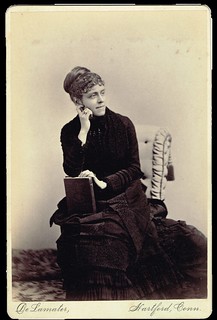“I never can do it,” thought I. “Tom will hoot at you if you don’t,” whispered the inconvenient little voice that is always goading people to the performance of disagreeable duties, and always appeals to the most effective agent to produce the proper result. The idea of allowing any boy that ever wore a felt basin and a shoddy jacket with a microscopic tail, to crow over me, was preposterous, so giving myself a mental slap for such faint-heartedness, I streamed away across the Common, wondering if I ought to say “your Honor,” or simply “Sir,” and decided upon the latter, fortifying myself with recollections of an evening in a charming green library, where I beheld the Governor placidly consuming oysters, and laughing as if Massachusetts was a myth, and he had no heavier burden on his shoulders than his host’s handsome hands.
Like an energetic fly in a very large cobweb, I struggled through the State House, getting into all the wrong rooms and none of the right, till I turned desperate, and went into one, resolving not to come out till I’d made somebody hear and answer me. I suspect that of all the wrong places I had blundered into, this was the most so. But I didn’t care; and, though the apartment was full of soldiers, surgeons, starers, and spittoons, I cornered a perfectly incapable person, and proceeded to pump for information with the following result:
“Was the Governor anywhere about?”
No, he wasn’t.
“Could he tell me where to look?”
No, he couldn’t.
“Did he know anything about free passes?”
No, he didn’t.
“Was there any one there of whom I could inquire?”
Not a person.
“Did he know of any place where information could be obtained?”
Not a place.
“Could he throw the smallest gleam of light upon the matter, in any way?”
Not a ray.
I am naturally irassible, and if I could have shaken this negative gentleman vigorously, the relief would have been immense. The prejudices of society forbidding this mode of redress, I merely glowered at him; and, before my wrath found vent in words, my General appeared, having seen me from an opposite window, and come to know what I was about. At her command the languid gentleman woke up, and troubled himself to remember that Major or Sergeant or something McK. knew all about the tickets, and his office was in Milk Street. I perked up instanter, and then, as if the exertion was too much for him, what did this animated wet blanket do but add–
“I think McK. may have left Milk Street, now, and I don’t know where he has gone.”
“Never mind; the new comers will know where he has moved to, my dear, so don’t be discouraged; and if you don’t succeed, come to me, and we will see what to do next,” said my General.
I blessed her in a fervent manner and a cool hall, fluttered round the corner, and bore down upon Milk street, bent on discovering McK. if such a being was to be found. He wasn’t, and the ignorance of the neighborhood was really pitiable. Nobody knew anything, and after tumbling over bundles of leather, bumping against big boxes, being nearly annihilated by descending bales, and sworn at by aggravated truckmen, I finally elicited the advice to look for McK. in Haymarket Square. Who my informant was I’ve really forgotten; for, having hailed several busy gentlemen, some one of them fabricated this delusive quietus for the perturbed spirit, who instantly departed to the sequestered locality he named. If I had been in search of the Koh-i-noor diamond I should have been as likely to find it there as any vestige of McK. I stared at signs, inquired in shops, invaded an eating house, visited the recruiting tent in the middle of the Square, made myself a nuisance generally, and accumulated fine samples of mud from every gutter I fell into. All in vain; and I mournfully turned my face toward the General’s, feeling that I should be forced to enrich the railroad company after all, when, suddenly, I beheld that admirable young man, brother-in-law Darby Coobiddy, Esq. I arrested him with a burst of news, and wants, and woes, which caused his manly countenance to lose its usual repose.
“Oh, my dear boy, I’m going to Washington at five, and I can’t find the free ticket man, and there won’t be time to see Joan, and I’m so tired and cross I don’t know what to do; and will you help me, like a cherub as you are?”
“Oh, yes, of course. I know a fellow who will set us right,” responded Darby, mildly excited, and darting into some kind of an office, held counsel with an invisible angel, who sent him out radiant. “All serene. I’ve got him. I’ll see you through the business, and then get Joan from the Dove Cote in time to see you off.”
